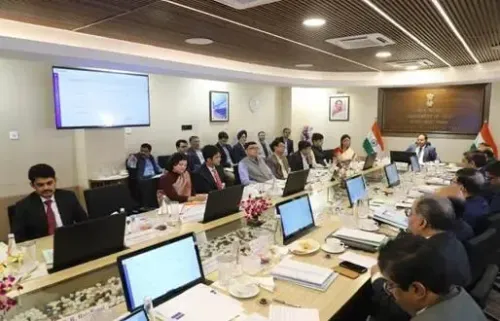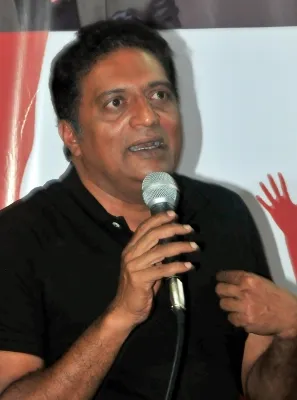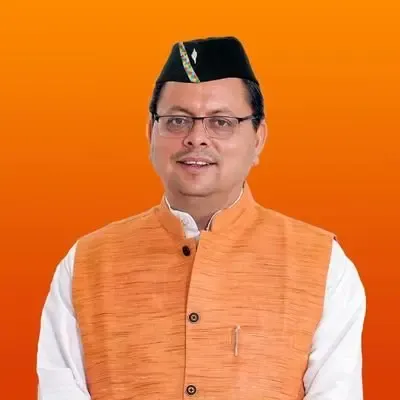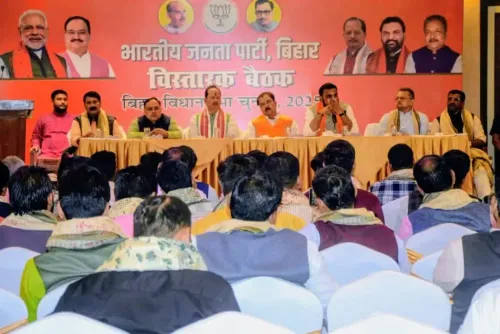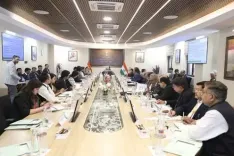Kejriwal Accuses CEC Rajiv Kumar of Bias Amid Yamuna Controversy
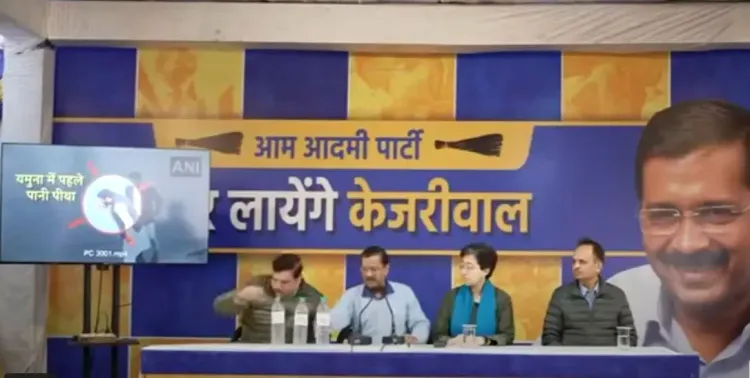
Synopsis
Key Takeaways
- Kejriwal accuses CEC Rajiv Kumar of favoring the BJP
- Claims Yamuna water contamination is worsening
- Sending contaminated water samples to political leaders
- Urgent need for safe drinking water highlighted
- Upcoming February 5 Assembly election adds urgency
New Delhi, Jan 30 (NationPress) AAP National Convenor Arvind Kejriwal on Thursday condemned the Election Commission's choice to reject his Yamuna ‘poison’ petition due to insufficient evidence, asserting that CEC Rajiv Kumar is biased towards the BJP as he seeks a post-retirement position.
During a press conference, the ex-Delhi Chief Minister questioned the grounds for the ECI's dismissal of his plea, indirectly accusing the electoral body of protecting its rivals, BJP and Congress.
CEC Rajiv Kumar is set to retire on February 28 after a three-year tenure with the commission.
"The ECI is engaging in politics and neglecting the obvious breaches of the model election code. It fails to recognize the distribution of bedsheets and money occurring. We have reported these violations, yet CEC Rajiv Kumar remains inactive as he is searching for a post-retirement job," he stated.
"I want to convey to Rajiv Kumar that history will hold him accountable for the harm he has inflicted on a vital institution like the Election Commission," Kejriwal remarked.
His criticism of the CEC came shortly after the poll panel expressed dissatisfaction with Kejriwal's response to the Yamuna 'poison' matter, indicating that "no factual, legal matrix with evidence has been provided to support his statement."
In a discussion with reporters, Kejriwal acknowledged that the ammonia levels in the river water had decreased to 3 ppm from 7 ppm a few days earlier, but he alleged that political maneuvering had raised the ammonia levels by Haryana in recent weeks.
He announced that he is sending four bottles of the "contaminated water" to BJP and Congress leaders, including Home Minister Amit Shah, Delhi unit chief Virendra Sachdeva, Haryana Chief Minister Nayab Singh Saini (all BJP), and Rahul Gandhi.
"These bottles contain chlorinated water from the river that had elevated ammonia levels and is unsafe for consumption. I challenge leaders from other parties to drink this," he asserted, branding CM Saini’s recent visit to the Yamuna bank in Delhi and his act of drinking its water as a "gimmick."
He explained that the water flowing into Delhi from Haryana had dangerous ammonia levels – up to 7 ppm – which could result in irreversible organ damage if processed at the DJB treatment facility.
"Allowing raw water with 8 ppm ammonia to be chlorinated at Delhi Jal Board treatment plants would have transformed it into poison," he added, stating that the four bottles containing samples of this hazardous water are being dispatched to BJP and Congress leaders.
The AAP National Convenor mentioned that Chief Minister Atishi had repeatedly reached out to her Haryana counterpart Saini over the past few weeks to demand action on the high ammonia levels in Yamuna water, but he made empty promises and subsequently ignored her calls.
Kejriwal, undeterred by threats from opposing leaders to pursue legal action against him or imprison him regarding the Yamuna ‘poison’ issue, declared: "I will not allow poisoned water to flow into Delhi taps. I am not afraid of incarceration."
Ensuring safe drinking water and cleaning the Yamuna are critical issues with which the ruling AAP is grappling against rival BJP and Congress ahead of the February 5 Assembly election, the outcome of which will be revealed on February 8.
Kejriwal’s claims about Yamuna ‘poison’ seem to be an effort to attribute Delhi’s water challenges to Haryana and rival BJP, which has in turn accused AAP of failing to fulfill its promises of a clean Yamuna and a consistent supply of safe water in the city.

